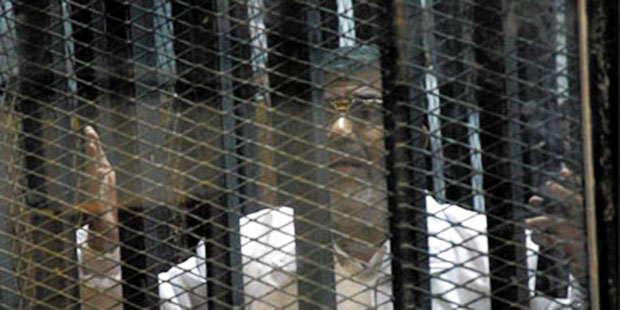 The trial of former President Mohamed Morsi and 14 other defendants for inciting murder was recessed until April 12 by the Cairo Criminal Court Sunday. Morsi and the other defendants are accused of inciting murder and torture of protesters outside Ithadeya, the presidential palace, in December 2012.
The trial of former President Mohamed Morsi and 14 other defendants for inciting murder was recessed until April 12 by the Cairo Criminal Court Sunday. Morsi and the other defendants are accused of inciting murder and torture of protesters outside Ithadeya, the presidential palace, in December 2012.
Morsi’s Ithadeya palace trial postponed to 12 April
By-Cairopost
Copts and Poliltical Islam
00:04
Monday ,07 April 2014

The session was postponed to allow the testimony of 15 other witnesses, according to state-owned Al-Ahram newspaper.
Journalists and media were denied access to the courtroom for Sunday’s session at the Police Academy, according to Youm7, with only state television granted access by presiding judge Ahmed Sabry. Sabry also placed a general media ban on the case, prohibiting any publication regarding the proceedings, according to Al-Shorouk newspaper.
During Saturday’s session, media were allowed access. Seventeen TV-based videos were presented, containing footage of pro-Muslim Brotherhood protesters tearing down tents of rival protesters and participating in the deadly clashes that ensued.
In another video, Morsi supporters were seen beating opposition protesters, tying one up to the palace gates and torturing another protestor until he confessed to being a paid ‘thug.’
According to Al-Ahram, a video of ultraconservative preacher Wagdy Ghoneim allegedly inciting violence against anti-Morsi protestors and calling them ‘infidel’ was also screened during Saturday’s session.
On Nov. 22, 2012, former president Mohamed Morsi issued a constitutional declaration granting him absolute powers and stating no judicial authority could dissolve the Shura Council or the Constituent Assembly that was then tasked with writing a new constitution for Egypt. The constitution also stated that the constitutional declarations, decisions and any laws issued by the president were final and not subject to appeal.
Following the declaration, many feared that Morsi may become Egypt’s new dictator, and his declaration was considered unconstitutional by liberal political powers. Continuous nationwide demonstrations followed the declaration, calling both for its abolition and for Morsi’s ouster. The nation’s first post-revolution president was accused of being a “puppet” in the hands of Brotherhood Supreme Guide Mohamed Badie.
In protest against the constitutional declaration, Morsi’s opponents camped outside the presidential palace before being attacked by Morsi supporters. Ten people were killed and hundreds injured in the ensuing clashes, with further accounts of torture soon surfacing.
“Our demonstration remained peaceful for three hours, until counter-demonstrations arrived, including opposition groups infiltrated by professional violent criminals paid by figures of the former regime,” read a statement published Dec. 7, 2012 on the website of the Brotherhood-affiliated Freedom and Justice Party.
On the anniversary of the clashes, the Brotherhood’s online English portal, Ikhwanweb, published a statement claiming that the clashes at Ithadeya were part of a conspiracy to attack Morsi’s legitimacy.
“Anti-Morsi protesters at the palace possessed narcotic substances and devices used in acts of violence and vandalism,” the statement read.
Morsi and 14 other prominent Muslim Brotherhood and Islamist leaders, including Badie, Freedom and Justice Party Chairman Saad Katatni, senior Brotherhood leader Mohamed Al-Beltagy and Freedom and Justice Party Deputy Chairman Essam el-Erian.
Morsi also stands trial in three other cases: insulting the judicial body, jailbreak for his prison escape during the January 25 Revolution, and espionage for working with foreign Islamist groups, including Hamas, to create chaos in Egypt.
Morsi has remained in custody since his July 3, 2013 ouster and until his first court appearance on Nov. 4, his place of detention was unidentified.


